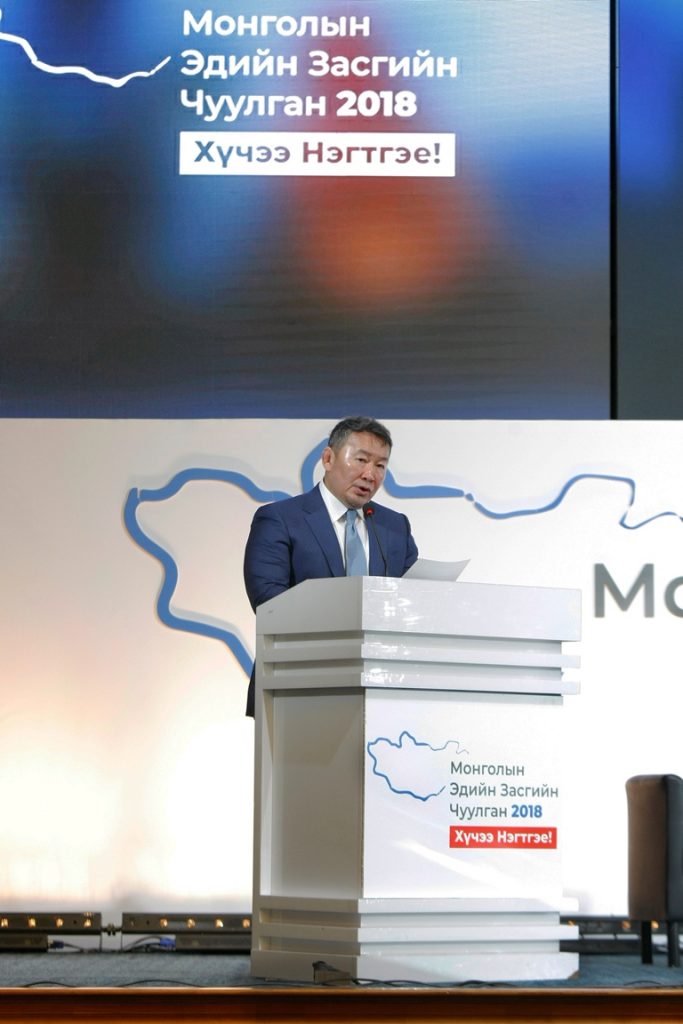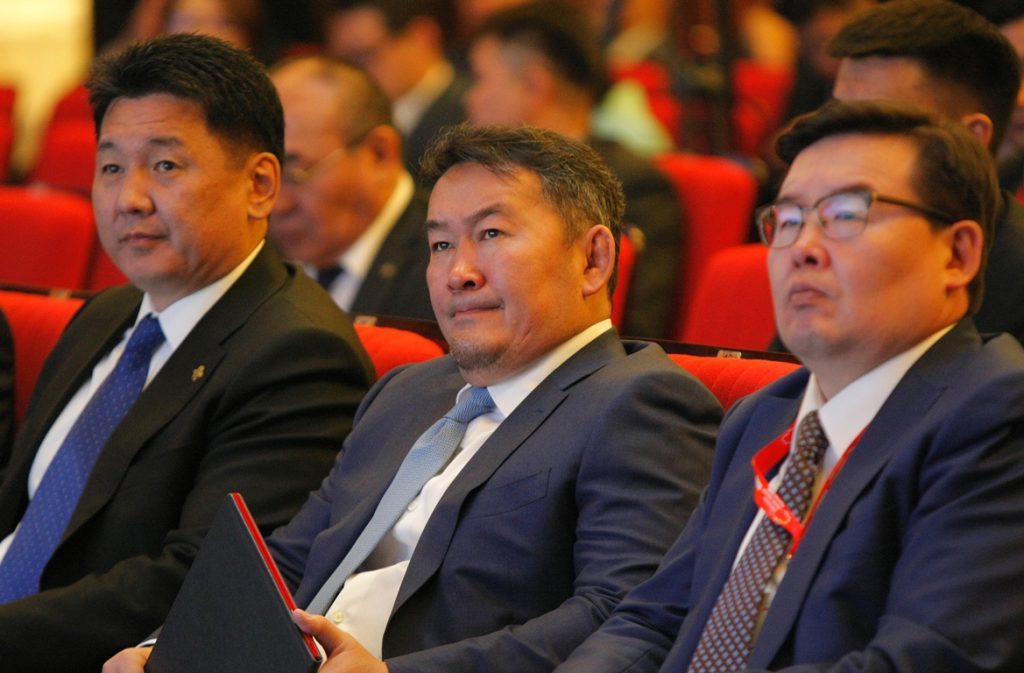PRESIDENT BATTULGA DELIVERS SPEECH AT GENERAL SESSION OF MONGOLIA ECONOMIC FORUM
President of Mongolia Khaltmaagiin Battulga addressed the General Session of Mongolia Economic Forum on Day 2. The President said:
“Good day to the distinguished guests and participants of the Forum!
Mongolia Economic Forum is continuing on its second day.
There are many things we need to dedicate serious considerations to. However difficult it is to listen and admit to, it is the high time we confronted the unpleasant truth.
Regardless of Mongolians’ imagination of and pedantry and debate over the growth of Mongolia and initiation of countless ornamented projects, geopolitics of great powers, their geo-economic tendency, power distribution and gravitations are the factors which bring actual effect to the Mongolian economy through forcing their interests on, halting and forwarding our projects.
Researcher Lucy Hornby wrote in the Financial Times, one of the leading finance and business newspapers, that Mongolian laws on mining and investment can be deemed the most liberal in the world. Aside from concluding that Mongolian mining and investment regimen as the most liberal on the globe, she added that Mongolian cabinets are keen to modify the mineral laws in favor of investors in order for major agreements to be secured.
Nevertheless, the amount of investment is not rising. Researchers strongly advise to seek the reasons from the instability of governance and geopolitical tendencies of the great powers of the world.
Boasting so-called most favorable legal grounds for investment, yet, Mongolia could not make the Top 80 countries that are “hospitable” to foreign investment, while our neighbor in the south was ranked at the 50th place and the Northern neighbor, at the 60th. Even Vietnam, which can be said to have started from the same start-line as Mongolia, was ranked at the 59th and Kazakhstan, at the 64th. This points to the fact that no matter how soft the conditions our laws offer to the investors, it means that major investments would still run away from us unless we make policies that keep up with the geopolitical interests of the great powers. As a comparison, it’s worth mentioning that China made direct investment of USD 42.8 billion and loaned USD 50 billion to Kazakhstan last year.

What I mean to say by breaking down all of the above is that the future of major projects of Mongolia is uncertain until we unite our interests with those of the neighboring great powers by becoming integrated with the regional economic alliances. We will go further only when we deciphered the mystery of hyper-dependency of Mongolian economy on external factors and sluggishness when it comes to exploiting full internal resources for the last 28 years.
Around the close of last year, after the US President Donald Trump had announced his new foreign policy, his Security Advisor Herbert McMaster said “Geopolitics are back, and back with a vengeance…”. It seems to be coming true as the days go by.
Balance of power in the modern world offers both pleasant and unpleasant for Mongolian conditions. The only reason behind the impressive 5.1 percent increase of GDP recorded in 2017 was the favorable condition provided by the sanctions imposed on North Korean coal exports, which allowed Mongolian coal export to rise on the occasion. I would like to underline that there has been no contribution whatsoever to the growth from the Government or the miners.
In all periods of history, Mongolian economy has been affected by the external factors more intensively than the internal factors, and it is projected to remain the same in the future. Our naïve imagination which brought hope in free-market economy, “the invisible hand” and privatization for the upheaval of our economy has failed to deliver in the face of reality. The invisible hand is impalpable for ensuring national security, and yet, geopolitics still remain effective.
As the international arena reforms at an incredible pace, new alliances and divisions are likely to arise. The recent events, in which, the DPRK Leader Kim Jong Un suddenly warmed his connections with the US and South Korea, Chinese authorities met twice with the North Korean leader within just a couple of months, and the US announced its exit from the Iran Nuclear Deal, Russia strengthened partnership with Syria and Iran and Europe announced the end of dependency on the US and began negotiations with Russia on the northern pipelines, as well as the US compromised on the trade deal with China, is expected to bring inevitable and irreversible geopolitical changes, followed by geo-economic convictions.
When the US President Trump announced the “National Security Strategy”, he introduced a new terminology called “Indo-Pacific” region, which is also a new category. According to Washington’s claims, the Indo-Pacific occupies a vast space stretching from western coasts of India to the America’s west coast. The new categorization is an expression of opposition to China’s rise to power. The US is not making bones about its interest in balancing out China’s growth in Asia, especially in Southeast Asia, and neutralizing Russia’s influence in the region. Meanwhile, China expresses its opposition to the US Policies through its Belt and Road Initiative, firm pursuit of globalization and close partnership with Europe and Russia.
The above-mentioned were not unpredictable at all, but the embodiment of assumptions, mainly issued by the WEF, about the eventual shift from mono-pillar to multi-pillar world order, stranglehold of globalization and inception of new alliances, contributed by the fall of western liberal democracy, shift of conflict of power to Eurasia and aspiration of the US to restore its scope of influence.
In such situation, discussions revolving around only Mongolian economic relations and policies can only be described as credulousness to be put softly. We can never ignore the fact that World Economic Forum, the specimen for today’s Forum in Mongolia, has been taking geopolitics and geoeconomics as its main agenda.
Economies of our two eternal neighbors are estimated to expend to a total worth of USD 30 trillion within the next three years, a study suggests. What will our involvement in the Belt and Road Initiative look like? 28 years of being thrown here and there by the current have brought us to a dead-end, in the absence of adequate policies that coordinate with the neighboring powers and harmonious actions with our “third neighbors” in order to balance influence.
It is not necessary to look for solutions from afar. Actualizing the National Security Concept approved by the Parliament in 2010 will open multiple opportunities.
National Security Concept states:
3.1.1.4. Good neighbor friendly relations and wide-ranging cooperation with the Russian Federation and the People’s Republic of China (PRC) shall be developed. More specifically, national interests and the history of bilateral relationships shall be taken into account while regional peace and stability, as well as a general balance of relations with neighbors shall be sought.
3.1.1.5. Pursuant to the “third neighbor” strategy, bilateral and multilateral cooperation with highly developed democracies in political, economic, cultural and humanitarian affairs shall be undertaken.
Pragmatizing these two will solve many issues.
Therefore, Mongolia must immediately enter into a Free Trade Agreement with the Eurasian Customs Union, which includes five nations, namely, Armenia, Belarus, Kazakhstan, Kyrgyzstan and the Russian Federation. With the agreement, I view that a trade opportunity with customs duty exemption will open with these five countries. Also, it is necessary to advance and activate cooperation with the Shanghai Cooperation Organization (SCO) within this year.
Not only will this allow for a favorable environment in the relations with the eight members of the SCO, it will also help accomplish something we were unable to actualize for many years, which is to join regional networks. Needless to say the population and economic capability of the SCO member states.
Only when creating favorable environment for foreign trade with this pragmatic approach, will we be able to attract tangible investment into Mongolia. Investors may even be able to export to European Union, Eurasian Economic Union and the SCO member states under favorable conditions, as well as non-tariff trade to Japan.
I impart that it is the convenient time to invest in Mongolia’s processing industry. Furthermore, I must mention that the country is holding a policy to retract raw materials export. The investors must note that over 7.0 thousand products manufactured in Mongolia will enjoy exemption of tax and quantity limit of European Union by joining the Eurasian integration.
Although the Cabinet is taking an initiative to focus on domestic issues by reforming the tax system, they are not utilizing the opportunities at hand that could raise tax revenue. We also need to estimate other possibilities of elevating tax revenue.
Only 10 products account for 96 percent of Mongolia’s exports. We have conducted a research, confirming that only semi-processed products which include value-added tax could build up USD 30.0 billion economy and create savings enough to fund the next phase investment.
Implementation of the already approved trilateral infrastructure network and economic corridor initiatives will provide enough profit that could equal Oyu Tolgoi project. We are now ready to sign transit transport agreement with the Russian Federation. Only when we develop the transit that connects the PRC and the Russian Federation and extends towards Europe from Eurasia, we will be able to eradicate the economic downfall that follows commodity cycle. Mongolia is able to exploit our status as one of the 57 founders of the Asian Infrastructure Investment Bank. We have no choice but to make Mongolia’s involvement active and clear in the land-based infrastructure development – Belt and Road initiative. Our geoeconomic opportunity lies here only.
If we manage to increase the revenue from Mongolia’s core sectors that fostered the country for centuries – agriculture and animal husbandry – in both environmentally-friendly and sustainable manners, we will create numerous workplaces and make substantial profit.
However, we lack political commitment and courage more than we lack necessary finance and capability. Looking back at South Korea amid the brinks of warfare and Singapore stranded at sea, they did not have wealth, chance or skills at the start of their road to become the Asia’s leading economy. It was their aspiration, sincerity and bravery that earned them today’s status.
A medieval thinker Niccolo Machiavelli described the three factors of a successful state as:
- Virtu – the courage and determination of the leaders
- Necessita – the willingness of leaders to implement what they consider necessary
- Fortuna – luck.
I believe that Machiavelli meant a resolute and valiant politician capable of administering what they deem necessary will be lucky enough to lead the nation towards success. This is the only thing Mongolia and its economy are lacking. The ruling Cabinet has only a year and a half left until the end of its term. We have to think twice about whether we have the time to decide and establish.
Mongolia Economic Forum has been carried out for eight consecutive years. People has to stop gathering here just to quibble and pretend to be smarter than others. I hope that they discuss more about actual projects, pressing issues and find effective solutions.
I would like to point out once again that pragmatic economy, instead of theories and wise judgements, requires political courage, commitment and decisiveness. Today, pedantry has taken over Mongolia, while decisiveness became a rarity.
I hope the participants of the forum realize that their voters will not support or bear the current situation if we do not lower our head and take actions for our people from this point on.
Taking this opportunity, I wish success in the organization of the Economic Forum.
May the future be bright. May the Eternal Sky watch over us.”



